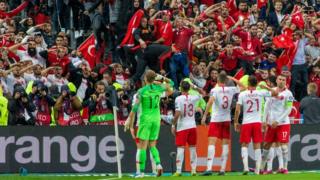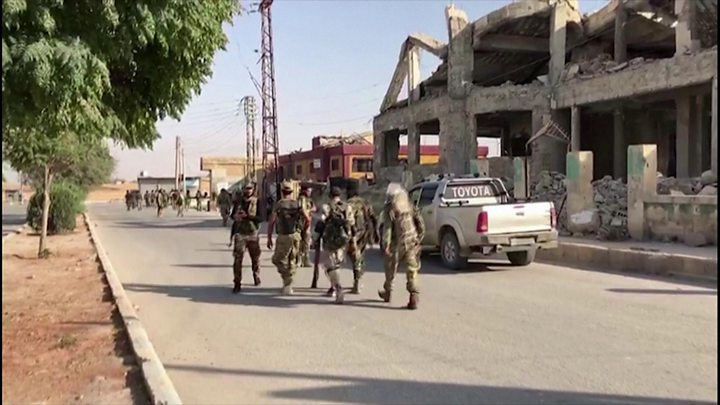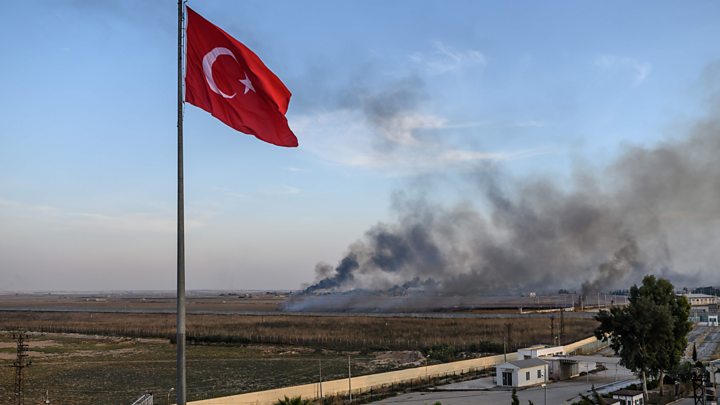Turks embrace nationalist mood for Syria offensive
They had been warned not to make political gestures, but they have now done it twice.
Turkey’s national football team stood on the pitch in their red and white strip and gave a military salute to the stands in celebration of their goals. First against Albania on Friday and then again against France on Monday night.
The salute was immediately adopted by supporters frantically waving Turkish flags in the Stade de France on Monday night.
Their action was in tribute to Turkey’s military operation in Northern Syria and “a symbol of defiance” amid international condemnation of Turkey’s operation.
Football in Turkey has always been instrumental in galvanising national sentiment when played in international leagues but even more so when fuelled by anti-Western feeling.
The spirit of “conquest” soon followed on social media.
“Get to know us, France. While you condemn us, we give you a military salute in your own land. Long live Turkey, we are making history,” proclaimed one Twitter user, while many others added the hashtag “#ConquestofEurope” (AvrupaninFethi).
Another declared: “A quick reminder to Western media and Uefa who consider a military salute as a political or a racist message: This is not a political message but a way of expressing respect for the soldiers of this Republic which has been built over its soldiers’ blood.”
Why Turks are backing their army
The mood in Turkey’s border town of Akcakale is no different. “We are ready to go to the frontline and fight,” flag-waving residents told BBC Turkish. “We are waiting for our President Erdogan’s order.”
Turkey have been fighting the Kurdish militant PKK in Turkey for over three decades and those backing Turkey’s military intervention in northern Syria see this move as an extended fight.
The manifestation of support for Turkey’s military reflects the general nationalist mood in Turkey and is heard much louder than criticism.
Mainly because those who dare to disagree with the national discourse of the military operation face criminal charges.
Legal action has been taken against nearly 80 social media users who criticised the operation. They are accused of “inciting hatred and engaging in terror propaganda”.
Many Twitter accounts belonging to Kurdish activists and journalists are blocked in Turkey.
President Recep Tayyip Erdogan’s main instrument in driving his power to shape public opinion has largely been through the media, which he is accused of using as a propaganda machine.
Mainstream media outlets are largely owned by Mr Erdogan’s associate conglomerates.
And there is little surprise that opposition voices are also muted in the mainstream media, which now stand largely as a pro-government mouthpiece.
Well-known Turkish TV presenters flocked to the border in military gear narrating the intervention in a heroic and lyric mood.
A strong nationalist narrative is also embraced by the press. They hardly give space to criticism, and when they do they tend to criticise it.
British Labour Party MP David Lammy was not spared.
Mr Lammy criticised the Turkish operation with footage of a dead child: “The human face of Trump decision to give Turkey a free pass to attack Kurdish allies in north-eastern Syria. Heartbreaking.”
Pro-government CNNTurk channel accused him of spreading “black propaganda” about Turkey’s military intervention, tweeting the piece with a darkened image of the MP that many believed was a racial reference.
What Turkey’s Kurds think
Turkey’s official line in this operation is to clear the border of the Syrian Democratic Forces, who are largely made of Syrian Kurdish fighters, along with Arab and Christian fighters.
Kurds in Turkey make up to around 20% of the country’s population. Their voice is nowhere to be heard either.
Residents of the Kurdish-dominated town of Diyarbakir have mainly chosen to remain silent in fear of legal action against them.
That goes for a spice shop owner in Diyarbakir’s busiest bazaar who told BBC Turkish: “Everybody is aggrieved, but we repress our feelings. When you have too many police in plainclothes around, nobody would talk to you.”
The political parties are largely following the ruling AK party’s government line: the secular CHP, nationalist Good Party and the nationalist MHP all back the military operation.
There is just one exception in the opposition: the pro-Kurdish HDP party. Their leadership is behind bars, and their members face legal charges, intimidation and constant online abuse.
Pockets of HDP members trying to hold rallies against the military intervention in the south-eastern part of Turkey have either been detained or forced to leave by the police.
Police raided several municipalities in the mostly Kurdish-populated towns of Hakkari, Mardin and Van on Tuesday, detaining a number of Kurdish administrators, including co-mayors.
With voices opposing the military operation muted and intimidated, nationalist sentiment is all that remains, mainly driven by pro-government media.
Source: Read Full Article





